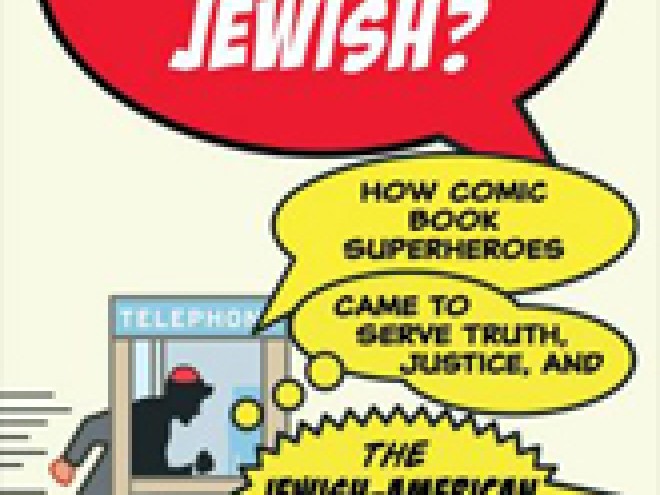2013 marks the seventy-fifth birthday of America’s first and best-known superhero. People have been writing about Superman since his birth in 1938, and even in this age of super-fast digital media, publishers are still delivering books on the topic. Hot off the press are three new books that will satisfy even the most avid fans of Superman, as well as readers who are interested in learning more about the connection between Superman and Judaism.
According to Superman biographer Larry Tye, the late mayor of NYC, Ed Koch, toasted Superman on his fiftieth birthday with the traditional blessing, “may you live to 120!” But is Superman Jewish? Tye shows how Superman’s values can be claimed by all major religions, while Harry Brod answers with a resounding yes, not only in reference to Superman’s religious affiliation, but to that of most of the other well-known superheroes. Rick Brower’s book shows how America’s favorite superhero tackled the machine of hate known as the Ku Klux Klan and, in the process, won the respect of millions of fans.
Tye’s book is the most comprehensive biography ever written about Superman. It covers the Man of Steel’s entire life, from birth to death to rebirth (since most superheroes (and villains) rarely stay dead in the realm of comics). Tye explores the entire cast of characters in Superman’s world, from Lois Lane, Jimmy Olsen, and Perry White to Lex Luthor, Mr. Mxyxptlk, and other archenemies. He traces Superman’s appearances from the very first comic book and comic strips to early radio and TV cartoons, then to live action TV shows, movies, and even a Broadway show. The Man of Steel was eagerly co-opted by advertisers as an icon of American values; from war bonds urging citizens to support their troops, to cereal boxes exhorting children to eat healthy, Superman was on hand to deliver the message.
Integral to the story of Superman is the saga of Jerry Siegel and Joe Shuster, the Jewish teenagers who created the superhero as a way to escape from their lives as poor immigrants in Cleveland, Ohio. Tye delves deeply into the lives of Siegel and Shuster, and threads their successes and failures, both in the publishing world and in their home lives, throughout the book. Interwoven with the tale of Siegel and Shuster is the birth of the comics industry and the impact that comics had on society. Tye’s entertaining and informative biography has extensive notes, a comprehensive bibliography, and even an appendix with Superman’s curriculum vitae. A center section contains photographs of Siegel and Schuster, images of Superman as his image changed in the hands of different artists, as well as photographs of the actors who brought Superman to life in radio, TV, and movies.
Brod takes the story of Siegel and Shuster and expands it beyond Superman to encompass the Jewish roots of other superheroes. His stated aim is to show the influence of Jews and Judaism on comics, and he achieves his goal with copious examples and a good dose of humor. Moving from Superman through the Golden and Silver Ages of comics, Brod takes readers on a whirlwind journey through history’s most influential comic book authors. The big names are all here: Jack Kirby, Stan Lee, Will Eisner, Joe Kubert, Art Spiegelman. There is even a chapter that looks at comics originating outside of the United States; notable authors, such as Rutu Modan from Israel and Joann Sfar from France are given ample space. Brod’s book packs a lot into barely 200 pages; it could easily be used as a textbook for a course on the influence of Jews in the comic book industry. Detailed notes round out the volume.
As the slogan goes, Superman fights for “truth, justice, and the American way.” This sentiment was tested in 1946, when the caped crusader battled the Ku Klux Klan on live radio. Bowers traces the rise of both Superman and the KKK in his gripping account aimed at younger readers, but just as suitable for adults. As in Tye’s biography, Bowers begins at the beginning, describing the lives of Siegel and Shuster and their efforts to bring forth a hero to help lift them out of their impoverished lives. He addresses the question of Superman’s Jewishness by acknowledging the similarities that other authors have debated over the years: the Hebrew-sounding name of Kal-El, the Moses-like exile to another world, and the embodiment of tikkun olam that makes Superman a hero. However, Bowers affirms that “What Superman wasn’t was just as important as what he was…The Superman character offered a little bit to everyone…he was the quintessential American.” Therefore, as a quintessential American, it was Superman’s duty to confront racism and anti-Semitism, and to do his part to enlighten his fans about the evils of the KKK. Bowers introduces readers to a real hero, Stetson Kennedy, who helped infiltrate the KKK and bring awareness to the public. In June 1946, the forces of good collided with the forces of hate, and the 16-part “Clan of the Fiery Cross” was presented on live radio. In the story, Superman, Jimmy Olsen, and Perry White triumph over hate. The resulting awareness worked to weaken the KKK, and Superman’s message of tolerance was received to great acclaim. Bowers’s book contains historical photographs, a bibliography, notes, and an index, making this high-quality book a perfect resource for American history students and buffs.
In order to fully celebrate Superman’s seventy-fifth birthday, first read Superman is Jewish? for its overview of superheroes and the Jews who created them. Then read Superman, the biography, for its thorough focus on the Man of Steel. Finish off with Superman Versus the KKK to get a detailed example of how Superman became so intertwined with American life and values. Then get in line for Man of Steel, the newest Superman movie, slated to be released in theaters on June 14, 2013.





